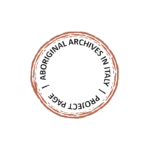About
Who I am
My name is Monica Galassi, I am a doctoral student at the University of Technology, Sydney (UTS) and a Researcher at the Jumbunna Institute for Indigenous Education and Research.
My drive for working in the field of Aboriginal cultural heritage has always been the advancement of social justice and human rights. I am especially interested in how professionals working within the cultural sector could contribute to this area. I moved from Italy to Gadigal Country (NSW) to work in the library and archival field in 2011. Therefore, I undertake this study from the standpoint of a white woman, who was born and grew up between the north and the centre of the Italian peninsula.
In 2011/2012, I had travelled around Italy to find out information on colonial archival collections containing information about Aboriginal and Torres Strait Islander peoples. Over the years, I had conversations with Community members and Italian professionals interested in knowing more and in opening up spaces for dialogue. The project Aboriginal Archives in Italy was born with this gap in mind.
More information on my work and interests is available on my profile on the UTS website and on my Twitter profile.
Background
The Aboriginal Archives in Italy research project began in 2020 as part of my doctoral studies at the School of International Studies – Faculty of Arts and Social Sciences (FAAS), University of Technology Sydney (UTS). It was developed in collaboration with the Jumbunna Institute for Indigenous Education and Research at UTS and other partners in Australia and Italy. Its key goal is to encourage dialogue on the rich archival patrimony held in Italian collecting institutions that can contain precious information related to the histories and experiences of Aboriginal and Torres Strait Islander Peoples.
At its core, this project aims to promote connections between Italian institutions and Aboriginal and Torres Strait Islander GLAM workers and Community members and organisations who are interested or connected to these stories. It also aims to start conversations on what a future space of exchange between Italy and Australia could look like over the future.
Another goal of this study is to creates opportunities to highlight connections among these archival records distributed across Italy and inspire institutional exchanges and collaborations. This can be particularly important for peoples looking for information about them and their families and institutions and researchers interested in bringing to light connections and the provenance of this documentation.
How these records ended up in Italy?
It was during the “Voyages of discovery” that gave rise to colonialism, that Europeans travelled to the country we now call Australia. A range of authors (explorers, missionaries, surveyors, anthropologists, government officials and private individuals) wrote diaries, journals, official documents, drawings and took photographs of Aboriginal and Torres Strait Islander peoples.
As part of the Australian colonial project a considerable amount of this information was sent to collecting institutions in Australia and overseas, and exchanged and sold among European collecting institutions, churches, cultural societies, and private collectors. A number of these records are still held in Italy, scattered among different regions, institutions and collections. Hence, many of these records are expressed in Italian language as they were created for an Italian audience.
How to navigate ‘Aboriginal archives in Italy’
This digital space is structured in two parts:
(1) the website you are now navigating, a multilingual website with information and resources about the project and the management of collections
(2) a prototype of a digital archive created explicitly for Aboriginal and Torres Strait Islander users, where to access examples of archival collections.
These complimentary digital spaces have been envisaged and structured to support the needs of both Aboriginal peoples, communities and organisations who want to access the collections, and Italian institutions and researchers interested in opening up respectfully their archives and work collaboratively.

